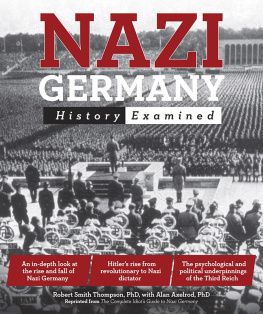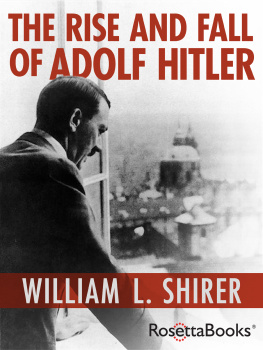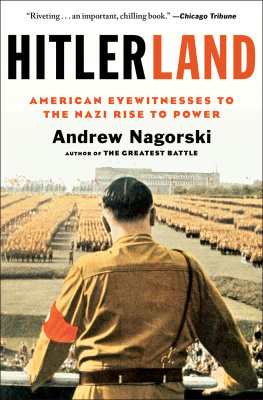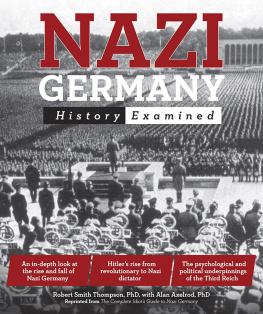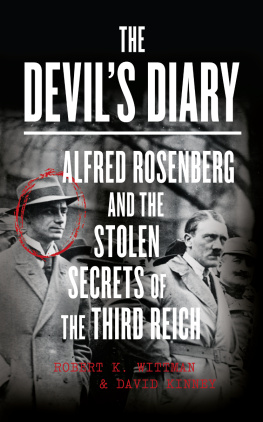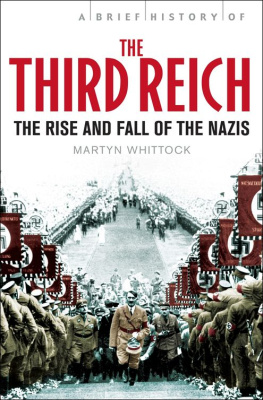The Third Reich: Nazi Rise and Fall
The Rise & Fall of Hitlers Germany in World War II
Second Edition
All Rights Reserved. No part of this publication may be reproduced in any form or by any means, including scanning, photocopying, or otherwise without prior written permission of the copyright holder. Copyright 2015
Disclaimer Notice:
Please note the information contained within this document is for educational purposes only.
Every attempt has been made to provide accurate, up to date and reliable complete information no warranties of any kind are expressed or implied. Readers acknowledge that the author is not engaging in rendering legal, financial or professional advice.
By reading any document, the reader agrees that under no circumstances are we responsible for any losses, direct or indirect, which are incurred as a result of use of the information contained within this document, including but not limited to errors, omissions, or inaccuracies.
Table of Contents
Introduction
Chapter 1: Hitler
Chapter 2: The Inception of the Nazi Party and the Third Reich
Chapter 3: The Rise
Chapter 4: 1919-1933
Chapter 5: Coordination and Control
Chapter 6: War and Defeat
Chapter 7: The Last Days
Conclusion
Introduction
Thank you for downloading this book, The Nazi Rise and Fall.
In November 1918, World War One came to an end. For many, especially in America, the war was The War to End All Wars, as President Woodrow Wilson had claimed. In order to make sure that this was the case, Wilson had drawn up Fourteen Points to add to any treaty that would officially end the war. Many people hoped that these Points would provide a pathway for a new peaceful future. It was a pipe dream.
There were millions dead after the war. It had been the most costly conflict up to that time. Billions of dollars in damage had been inflicted. Anger and the desire for revenge were underneath the war weariness present in many countries, even among the victors. The large empires of Europe, like Austria-Hungary and the Ottoman, were breaking up into smaller nations, a process which would be formalized in the Versailles Treaty, which ended the war. Russia was involved in a bloody civil war. Ethnic violence was taking place throughout much of the continent as borders were redrawn.
With the end of Austria-Hungary and the Ottoman Empire, the only nation left from the central powers was its strongest member, Germany. Germany had been the nation that caused the most damage to the Allies during the war and occupied the most territory. Many in France and Britain blamed Germany for starting the war. Though the German government could have possibly put a halt on Austria's actions against Serbia, which began the war, German did not start the conflict. As a matter of fact, all of the major powers of Europe had played a role. When the war ended, Germany was the only one left, and the amount of damage it had inflicted caused the Allied powers of Britain and France to seek harsh terms...
The Third Reich or Nazi Germany as it is popularly known are the names given to the period of history in Germany that extended from 1933 to 1945. It was a reign of dictatorship under the control of Adolf Hitler and the Nazi Party (NSDAP). Hitlers ruling made sure that Germany was slowly turned into a fascist totalitarian state. It controlled a lot of aspects of life. Hitler was so proud of the Third Reich that he was known to have boasted that it would last for a thousand years.
However, Hitlers dream was short lived as it managed to last only for a total of twelve years. Although, its tenure was short lived, the Third Reich did manage to strike a certain terror into the hearts of all its foes and even those of the future generations. The President of the Weimar Republic, Paul von Hindenburg appointed Hitler as the Chancellor of Germany on the 30 th of January 1933. Hitler ended up becoming the dictator of Germany after the death of President Hindenburg. On 19 th August 1934, Hitler was confirmed as being the sole leader or Fuhrer of Germany. His word became above all laws because all the power became centralised in his hands.
It was not all bad because they did manage to end the Great Depression in Germany by following a mixed economy and providing employment for the unemployed people in Germany. The way that they managed to restore economic stability won the hearts of the people and it increased the regimes popularity.
During this time, the Germans were considered to be the purest among the Aryan race and they established themselves as the master race. People like the Jews and others were branded as undesirable and they were persecuted mercilessly during the holocaust. Any opposition to Hitlers rules or laws were vigorously supressed. The Nazi party under Hitlers influence were extremely adamant on territorial issues.
In 1938 and 1939, they seized Austria and Czechoslovakia. Later on he managed to initiate the Second World War when he invaded Poland after having made a treaty with Joseph Stalin. With the assistance of the Axis powers, Germany was able to bring most of Europe under their control. This went on up to the point where Germany began threatening to take over Great Britain. The undesirables and those who opposed the Nazi party and Hitler were punished around this time. The Jews and the other offenders were herded into extermination and concentration camps.
The Holocaust saw the mass homicide of the Jews and the other people that were gathered in those camps. The Germans invaded the Soviets in 1941. Following this event, the Third Reich ran into a series of unfortunate and cataclysmic events. It suffered multiple major military defeats in the year 1943. The war ended with the triumph of the Allied powers over Germany. However, Hitler adamantly refused to come to terms with the defeat and this caused the other countries to wreak more havoc on Germany. The Nuremberg trials saw a lot of Nazi leaders being prosecuted for all the crimes they committed.
Please feel free to share this book with your friends and family. Please also take the time to write a short review on Amazon to share your thoughts.
Chapter 1: Hitler
Austria, a country with royal history and characterized by the villages on top of the mountains, saw the birth of an individual who was set to rewrite the history of the Nazi empire. On April 20 1889 Adolf Hitler was born to Alois Hitler and Klara Polzl. His birth took place in a small town called Braunau am Inn. Before Hitler was born, the couple had three other children but all of them died in their infancy. Hitlers family moved to a small town in lower Bavaria called Passau in Germany. This is how he acquired the lower Bavarian dialect, which he used in speeches throughout his life instead of Austrian German dialect.
During his childhood, the family moved around a lot of places- Leonding in 1894 and Hafeld near Lambach in 1895, where his father retired. Hitler stayed in a small landholding and attended a state owned school in a state of upper Austria. Hitler had a few conflicts with his father about his new school being too stern on the matter of discipline. Alois had repeated failure in the field of farming and made the decision to move to Lambach in 1897. Soon they returned to Leonding permanently. In 1900, due to measles, Hitlers younger brother died. The death of his brother made the open-minded, self-assured young Hitler into a low-spirited, aloof kind of boy and even in his school he started fights with his teachers. His father son relationship was no exception.
Hitlers father was one of the most powerful people in the bureau and he wanted his son to carry on with his legacy. Once, Hitlers father took him to customs office, just to make him get acquainted with the work on the inside. Instead the situation turned into a series of hostility between the strong-willed father and son. Even as he knew his sons dream of becoming an artist, Hitlers father forced him to have secondary education in Linz in September of 1900. Hitler protested by giving poor performances in the examinations. He later revealed in his autobiography that his intentions were to show his father that he was not making any progress and so he should be allowed to pursue his dream.








